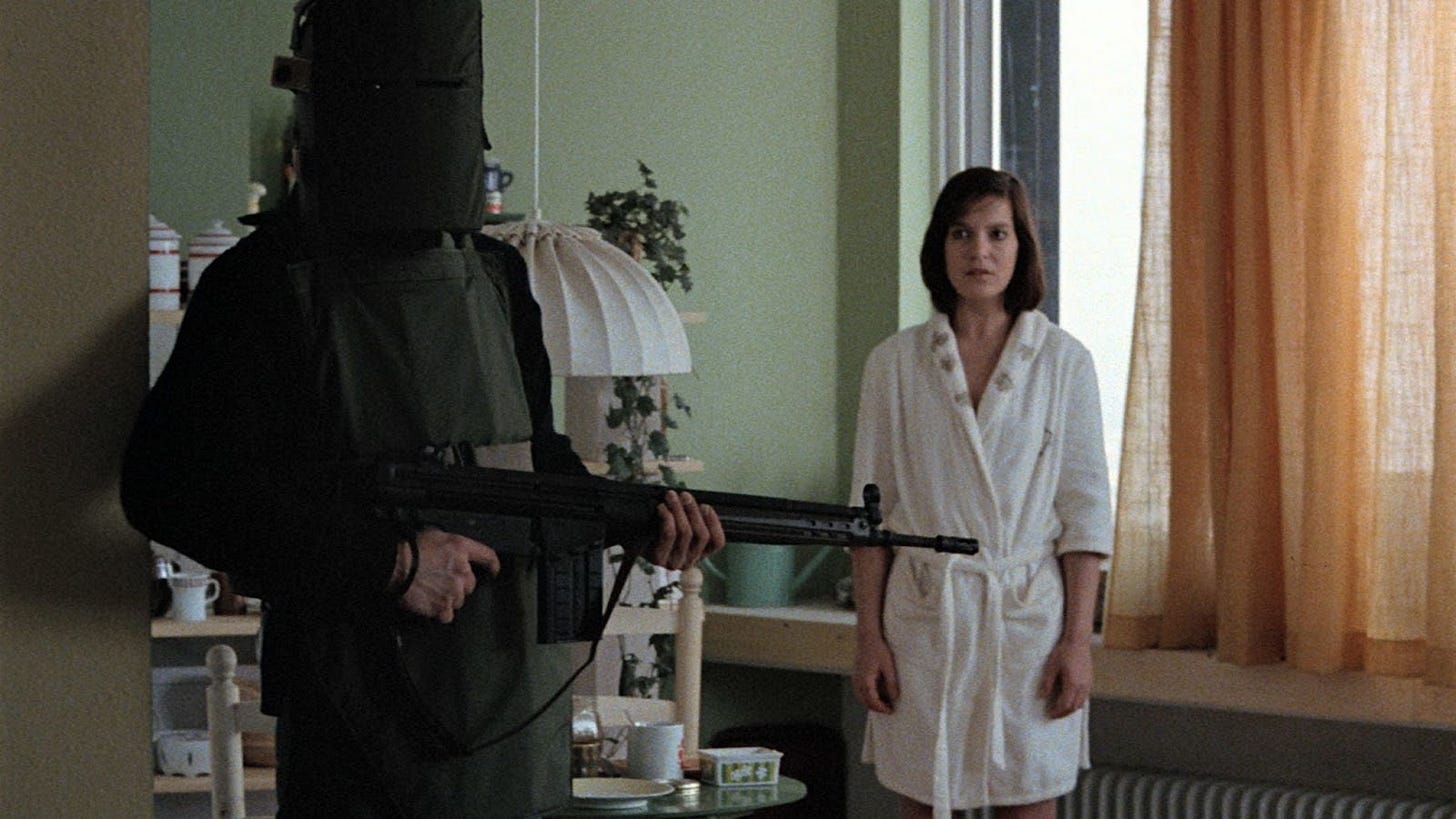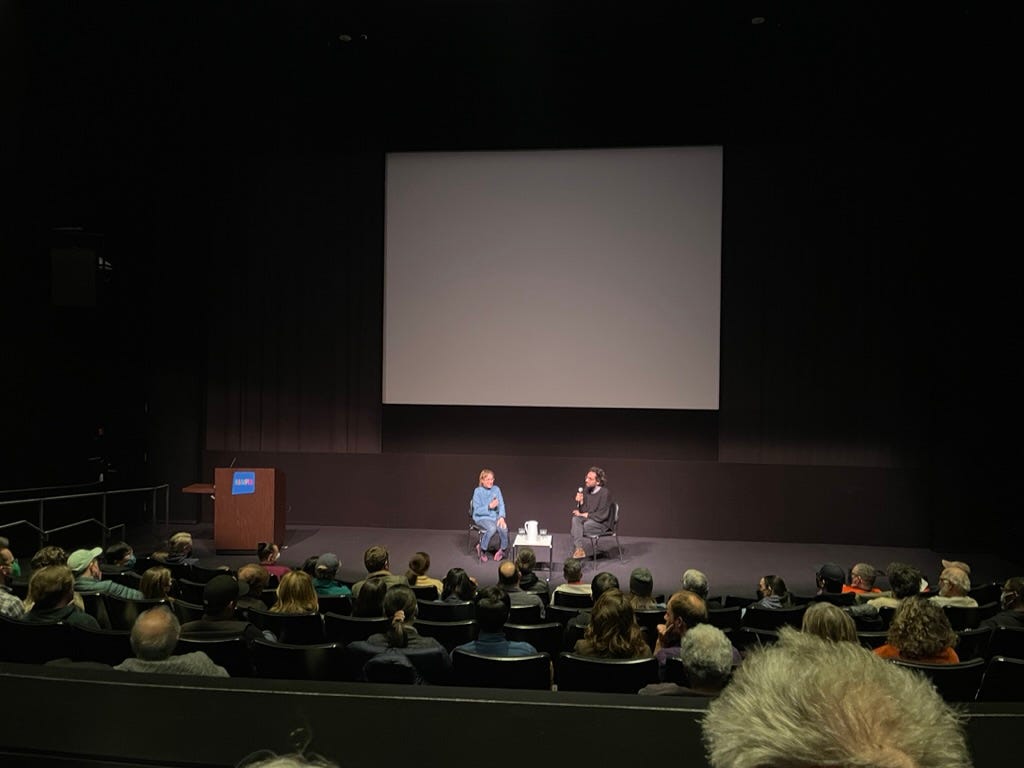The Lost Honor of Katharina Blum
Men are trash
Wednesday, February 5, 1975: A ferry ushers cars and passengers across a river. A young man, literally drifting, waits on the boat, restless—a third man films from a walkway. The St. Christophorus II arrives at its destination. Non-diegetically, an orchestra (of the damned!?) warms up as the mood becomes more sinister. Feeling watched and followed, or perhaps not feeling anything at all, the young man gets into a car (not his) and speeds off. His visage is captured through the black and white 8mm camera as he speeds into the distance.
Directed by Margarethe von Trotta and her husband at the time, Volker Schlöndorff, Die verlorene Ehre der Katharina Blum (The Lost Honor of Katharina Blum, 1975), is a film from the New German Cinema that scorches the earth it walks on. As the young drifter arrives at a party in downtown Berlin, exterior tracking dolly shots make us feel like passersby on the street as cars arrive and depart. Bossa nova plays in the background, and costumed partygoers mingle and make after-party plans. At the afterparty, we’re introduced to Katharina Blum, and as the young drifter watches her from another room, we begin to worry. Just as we start to worry, however, a wrinkle is introduced that turns the new-wave feel of the film into something much more sinister and, frankly, Hollywood-esque.
Thursday, February 6, 1975, Carnival Night: A 70s German SWAT team moves through ruinous streets on the outskirts of Berlin. The architecture of German suburban housing looms over the scene. The camera work, staging, and subject matter are as if Terry Gilliam and Chris Nolan went back and time and collaborated. In one sequence, when police are trying to assemble a timeline of events, we get a first-person black-and-white cut of a car chase involving a Porsche. The work that must have been put into achieving this seemingly frivolous shot, along with many others like it, must have been staggering.
Friday, February 7, 1975: Katharina reads the paper. The film’s depiction of tabloid journalism’s culpability in having a ruinous and amplifying effect on the truth is acutely prescient. Dieter Laser (awesome name), as the enterprising reporter attempting to piece a story together out of Blum’s arrest, chews up every scene he’s in like a proto-Robert Pattinson, preparing for a visit to a lighthouse.
When I started this film, I thought, “Huh, a movie making a point about the unfair treatment of women.” By the time I ended this movie, I wasn’t just nodding at a prescient piece of art. I was mad. A film can rarely push the right buttons to make you want to get out of your seat. As the film crescendos in its third act, the lines between patriarchal forces blur, and we approach enlightenment. (Enlightenment in the form of blind rage at most institutions.)
The Lost Honor of Katharina Blum is a provocative work of anti-fascist feminism that oozes with strikingly modern cinematic style. At times this style is the result of the expert filmmakers involved in the movie's production, and at times it’s the result of simply filming in an array of buildings built during reconstruction. In the eponymous role, Angela Winkler gives an entirely rounded performance: A woman who, in one scene, would rather go back to her cell than have even one more word with the men questioning her. If you’ve seen Suspiria (2018), you’ve already seen her in action. Her range spans loving, joyful, afraid, sneering, defiant, enraged, and ultimately…
Saturday, February 8, 1975: Events take a turn.
Sunday, February 9, 1975: “I’d like to do this on my own.”
The Lost Honor of Katharina Blum
Written and Directed by Margarethe von Trotta and Volker Schlöndorff
1975
104 minutes
German
Stray Thoughts from the Editor
March 31st already? Women’s History Month, for the second time on Movie Night, draws to an end. I had the pleasure of seeing First Cow at BAMPFA last week with my best movie pal, Rho, and director Kelly Reichardt was in attendance. Here’s a terrible photo I took, partly because I wanted to document that excellent 4:3 aspect ratio:
Sidebar: Aren’t hyperlinks great? They allow people to write about things that may be somewhat opaque and include little shortcuts to explain stuff like BAMPFA.
Reichardt answered a few questions about the film and spoke briefly about her latest, Showing Up. You should watch both movies, even if they don’t get full Movie Night write-ups. If you’re ever in NorCal, please visit BAMPFA.


